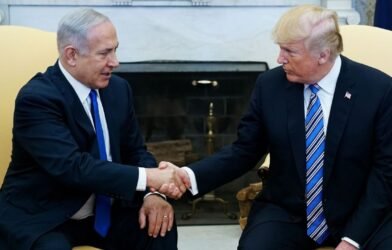Subtotal $0.00
The Chinese may remember the plan of the 1919 Paris Peace Conference, organized by the victorious powers of World War I, which sought to hand over German concessions in the eastern Chinese province of Shan Dong to Japan. Europe, which nearly a century ago was sharing China, a country large in area and population and steeped in human civilization, is now in need of Chinese money and influence, and fears being isolated from smaller European countries.
The most frightened by this Chinese rise today is the United States, which is demanding that its European allies stand in the way of Chinese penetration of the old continent - as they call it - but Washington seems to have forgotten that the United States has worked tirelessly to prevent the emergence of any European pole, and to perpetuate the Europeans' dependence on the protection of the US-led NATO against Russia. It has undermined the European consensus and worked to keep the EU weak. President Donald Trump even supported British Prime Minister Boris Johnson and his Brexit project, which dealt a painful blow to this fragile entity.
Does U.S. behavior with so-called allies and partners actually promote equality or dependency? Are U.S. interests also the interests of its allies?
Does American behavior with so-called allies and partners actually promote equality or dependence? Are American interests also the interests of its allies? Forget dealing with Asian countries and the Gulf states, especially Saudi Arabia, which was based on a policy of "milking" as Trump put it, the relationship between the two parties has always been based on the dependence of European countries on America, especially the so-called privileged relationship of London with Washington. The relationship between the two parties has always been based on the dependence of European countries on America, especially the so-called special relationship of London with Washington, and when President Donald Trump came, he was shockingly frank in this regard, as from the American point of view, the Europeans are nothing but a burden on the United States in terms of economic and security, so what has changed today except the desire and interests of the United States? Trump has ignored the reality that the United States formulated and benefited from after World War II, while blackmailing his European allies with tariffs and accusing them of free riding in the mothership
Why should Germany, a dying empire, identify with the United States as a power that fears its demise? Does it have anything to lose by dealing with China? China is Germany's first trading partner, and more than 4,000 German companies operate and benefit from the Chinese market. Is China like Russia for Europe to engage in a cold war against it? Russia is a large and powerful neighbor, whose history is based on the desire to expand, while China is a country at the ends of the Asian continent, and Europe desperately needs its large market, so why should it take it as an adversary for the eyes of the United States of America?
The major European powers, which were great empires that ruled the world until recently, are about to be reduced to ruins. The wealth that used to reach them from their former colonies has been cut off or almost cut off, and demographic growth has slowed down, except for some population increases due to migration from the Third World, and the labor and production forces have deteriorated due to advanced health care that has prolonged the lives of the population. The labor and production forces have also deteriorated due to advanced health care that has prolonged the lives of the population, making retirement costs large and the labor force small, all this in conjunction with the improvement of third world economies and their entry into the industrial and agricultural production lines that Europe monopolized until recently. For these reasons and more, European influence in international politics has declined considerably, and it makes more sense to think about self-preservation, rather than engaging in costly global conflicts, as Washington wants.
Europe's influence in international politics has declined so much that it makes more sense to think about self-preservation, rather than engaging in costly global conflicts, as Washington wants to do
If this is true in the case of the major powers such as Germany, France and Britain, it is even more true in the case of the smaller European powers, which have been plundered in terms of human wealth by their larger sisters and are already bankrupt, such as Greece, Romania, Serbia and Portugal, and the only savior who has extended a hand of cooperation to them is China, and on favorable terms, unlike the European partners, as well as the Americans.
US pressure has turned the 5G projects implemented by the Chinese company Huawei in Europe into a topic of contention among Europeans, claiming that China seeks to penetrate and spy on Europeans, but at the same time, are Americans innocent of this charge? It was revealed in 2015 that the US National Security Agency (NSA) was spying on the phone of German Chancellor Angela Merkel and her advisors, in addition to the US policy of "capitalizing" on the studies and expertise of German scientists after World War II. In an operation called Paperclip, between 1945 and 1959, the United States kidnapped 1,600 German scientists, technicians and technologists, some of them with ready-to-implement projects.
From the American point of view, China seeks to use the infrastructure projects on which the initiative depends to achieve geopolitical gains, and to entangle the beneficiary countries in a quagmire of debt so that they are always under Chinese pressure, and therefore it seeks to convince the Europeans to have an alternative to the Chinese initiative, but talk about European attempts and plans to block the Chinese Belt and Road Initiative (BRI) in Europe and work on a special European counter-project is unlikely, due to the lack of European economic capacity, and because
U.S. foreign policy has perpetuated a school of brutal realism with a moral coating of democracy and human rights, selective application and double standards
US foreign policy has enshrined the school of brutal realism with a moral coating of democracy and human rights, which is selective in its application and has double standards. The tragedies of Darfur, the Rohingya and the Uighurs, which are constantly conjured up to fulfill the US foreign policy objectives, are clearly visible in the way America raises the banner of democracy with ideological passion, and demands that Europeans join it in its war against the forces of international tyranny represented by China.
However, it is true that democratic systems have many advantages, the most important of which is that they represent a solution to the issue of disputes over power and the subsequent bloody conflicts over power, but at the same time they have a negative side, which is that the government is affected by the popular mood reflected in the election results, and therefore the democratic system makes governments often appeal to the public and avoid taking important unpopular economic and security decisions, in order to enhance their chances of staying in power, and the alternative is usually to resort to long breath policies and pass decisions quietly, which can lead to lost opportunities and enter a state of calcification and erosion.
The question in the Arab context is: Will the Arabs follow the same path as the Europeans by rapprochement with China? This seems likely for the same reasons, but in light of the Arab inability to generate a centralized Arab power, this situation will be an opportunity for regional powers such as Turkey and Iran to take the initiative and form their own spheres of influence, as European and American influence recedes. As for the Israeli occupation state, its fate and policy are tied to those who created and sponsored it, namely the United States and Europe.









